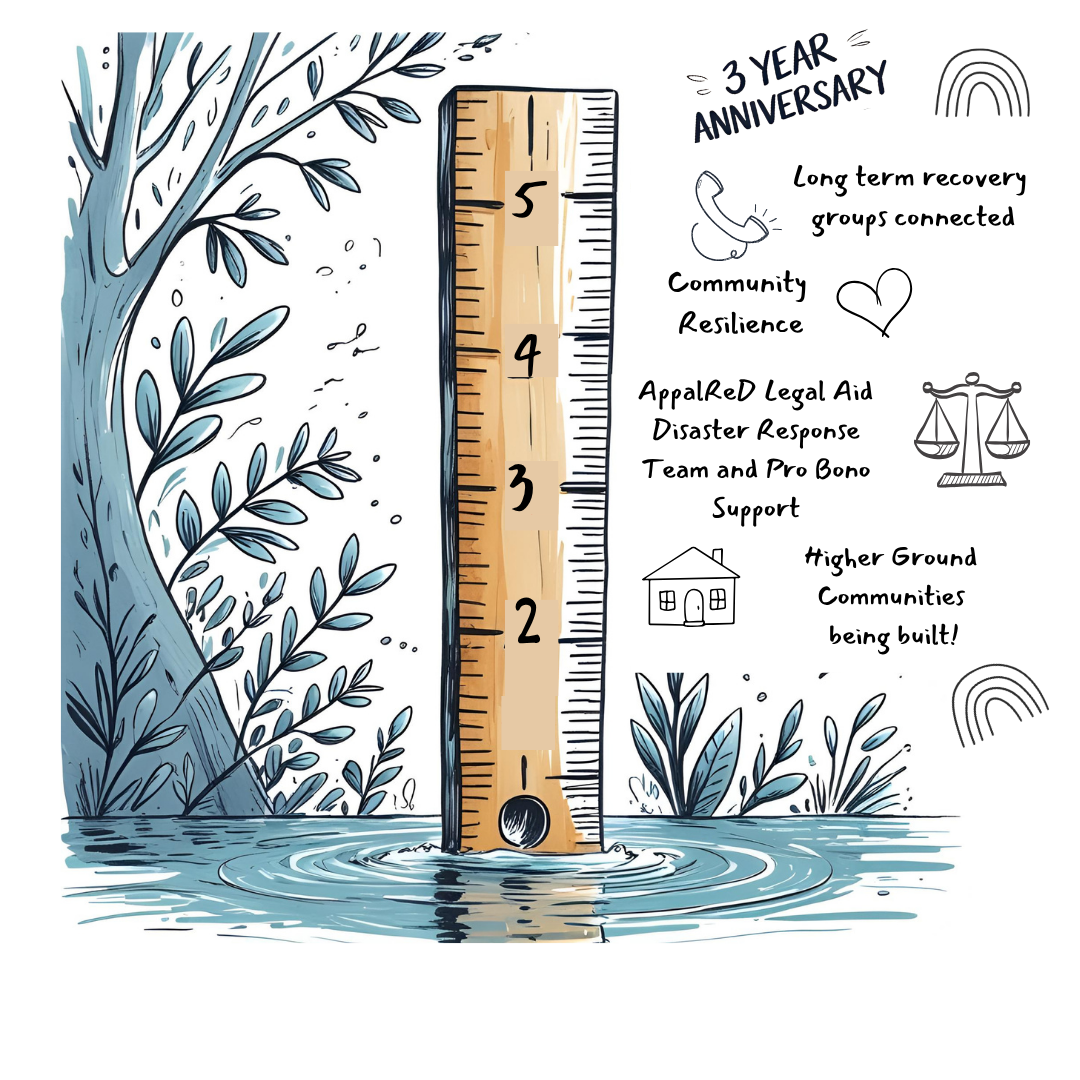Table of Contents
Three Years Later: Still Recovering, Still Growing, Still Fighting

By Sarah Curry
It’s been three years since eastern Kentuckians woke in a panic to rising waters. The July 2022 flood claimed 45 lives and washed away thousands of homes, leaving behind a trail of devastation—and complex legal challenges.
On the third anniversary, I sat down with Disaster Response Project Director, Whitney Bailey, to reflect on what’s changed, what hasn’t, and what we’ve learned from the people we serve.
Whitney’s life has been shaped by this work. The flood came just days before her daughter’s first birthday and in the middle of a move closer to family. Whitney and her husband had planned a celebration in Knott County—of course, the community center was underwater. Instead of balloons, cake, and moving boxes, they packed their truck with water, toilet paper, and donations and drove straight into the heart of the disaster zone.
About to turn four now, Whitney’s daughter is visibly taller, smarter, and more articulate than ever. A child’s growth is so obvious.
But how do we measure a community’s recovery? How do we record our own growth?
“We thought it was once in a lifetime.”
Whitney recalls that first drive into the flood zone with tears, “When we got to Breathitt County, houses were just gone.” She described the spray-painted X's on the remaining houses that had been checked by search and rescue.
Whitney was originally hired as a medical-legal partnership attorney, but she quickly found herself drafting FEMA appeals. “At the time, I didn’t even know exactly what FEMA stood for,” she laughs. “But very quickly I knew this work wasn’t going away.”
Three years later, she’s still helping July 2022 survivors—handling cases involving destroyed mobile homes, ruined vehicles and unpaid auto loans, and mortgage disputes.
But her work has shifted.
“In 2022, people thought this was once in a lifetime. They got FEMA assistance, and they rebuilt. But FEMA requires flood insurance for future help—and many couldn’t afford it and didn’t think they would ever need it. Now, in 2025 we’ve had three FEMA-declared disasters. The 2022 survivors have been hit again, and a lot aren’t eligible for most types of FEMA assistance because of the flood insurance requirement.”
Without FEMA, many survivors are turning to SBA loans—but are denied for lack of income or assets. They simply don’t have a workable repayment plan. “People are doing their best. They are leaning on long term recovery groups and other community partners.” There’s an uncharacteristic silence after I ask how people are getting by. “There’s less hope,” she finally says.
“This is my home.”
Whitney shares the story of an 80-year-old client who had just finished costly flood repairs in 2024 and moved back only to be flooded again in February 2025. “All she wants is to be back in her home.”
“I to try to counsel my clients the best I can. Do you want to keep going through this? You probably will long-term if you stay here. Of course, this woman tells me she’s not sure what long-term means being in her 80’s. But I encourage folks to apply for buyout programs or to Higher Ground communities. If you are in a flood zone, you need to consider relocating.”
When asked about climate change, Whitney says many survivors may not use that term—but they articulate that something’s changed. “People say, ‘I’ve lived here my whole life, and it’s never flooded like this. Or this high. Or this often.’”
“Don’t give up.”
There have been bright spots and growth. “There’s so much more coordination now—organizations talk to each other and know exactly what services are provided so we can make referrals and get folks the help they need. Community organizations are more prepared. AppalReD Legal Aid’s disaster team has expanded our capacity, has lots of experience with FEMA appeals, and our pro bono network is growing.”
When asked what keeps her going, Whitney doesn’t hesitate: “This is the most fulfilling work I’ve ever done. Every day, I get to make a difference. Whether it’s relieving the burden of paperwork or providing resources to someone without reliable internet—it matters.”
If she had a magic wand? “I’d make sure everyone who wants to live here has safe, affordable housing. And I’d make sure every county has a shelter-ready community center, with a commercial kitchen and showers.”
One more wave of the wand? “Outdoor warning sirens in every community and county.”
Her message to eastern Kentuckians still struggling—whether from 2022 or 2025? I am pretty sure I know her answer. She has a bit of a catchphrase that you’ll hear at any events she speaks at or when she hangs up the phone with a client.
“Don’t give up. Keep going. Even on the hard days. Keep your hope. Don’t give up.”
Whitney’s nearly-four-year-old daughter has her mother’s spirit. This year’s birthday theme? “Unicorns and lots and lots of rainbows.”
If you have a legal problem related to a natural disaster, please reach out to AppalReD Legal Aid’s Disaster Response Team at 1-844-478-0099 or apply online for help.
To learn more about housing opportunities in eastern Kentucky, visit HousingCantWait.org and complete the Disaster Recovery Interest Form.